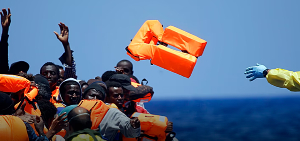Agogo-Ashanti, Oct. 07, GNA 96 A Malaria Vaccine Project to develop a vaccine to effectively combat malaria was launched at Agogo-Ashanti in the Asante-Akim North District on Friday.
Under the project clinical trials of the vaccine would be conducted on selected children at Agogo-Ashanti and Kintampo in the Brong-Ahafo region for the next two years to assess its efficacy and safety. It is being undertaken by the Kumasi Centre for Collaborative Research in Tropical Medicine (KCCR) in collaboration with the School of Medical Sciences of the Kwame Nkrumah University of Science and Technology (KNUST) and Kintampo Health Research Centre (KHRC). Scientists and researchers from KCCR and KHRC in collaboration with other foreign partners such as GlaxoSmithKline Biologicals (GSK Bio) and Malaria Vaccine Initiatives (MVI) would recruit 540 children between 5-17 months to participate in the project under close monitoring. Out of seven African countries selected for the feasibility study of the vaccine, Ghana is the only country that has selected two sites for the project.
Dr (Mrs) Gladys Norley Ashitey, Deputy Minister of Health, launching the project said about 3,500 people in Ghana die from malaria annually, a situation she described as alarming since the disease was curable.
She said malaria continued to reduce the Gross Domestic Product (GDP) of Africa by 12 billion dollars a year, and in Ghana and most parts of Africa malaria utilises about 25 per cent of household income and almost 40 per cent of the public health expenses. =93Malaria thus has a negative influence on the reduction of extreme poverty in the world which constitute the first Millennium Development Goals,=94 she stressed.
Dr Ashitey pointed out that the ministry's approval for the study into the vaccine amply demonstrated government's commitment to science and technology as a catalyst for accelerated development and called on stakeholders to assist the scientists and researchers on the project. Professor Tsiri Agbenyega, Dean of the School of Medical Sciences, said malaria had been viewed as part of everyday life in Africa and Ghana in particular.
He said more than one million people in Sub-Saharan Africa die yearly from malaria, inflicting tremendous suffering and huge economic and social problems on the people.
=93We know that immunisation is the best way to control infections diseases, so it follows that an effective malaria vaccine would represent a huge step forward in combating this terrible affliction,=94 Prof. Agbenyega added.
Nana Kwame Akuoko Sarpong, Omanhene of Agogo Traditional Area, observed that the emergence of HIV/AIDS had over the years overshadowed the fight against malaria which was the number one killer disease in Africa.
He commended the scientists for their laudable initiative and pledged his support to the project. 07 Oct. 06
Health News of Saturday, 7 October 2006
Source: GNA












